- Home
- James A. Michener
The Covenant
The Covenant Read online
The Covenant is a work of historical fiction. Apart from the well-known actual people, events, and locales that figure in the narrative, all names, characters, places, and incidents are the products of the author’s imagination or are used fictitiously. Any resemblance to current events or locales, or to living persons, is entirely coincidental.
2014 Dial Press Trade Paperback Edition
Copyright © 1980 by James A. Michener
All rights reserved.
Published in the United States by Dial Press Trade Paperbacks, an imprint of Random House, a division of Random House LLC, a Penguin Random House Company, New York. DIAL PRESS and the HOUSE colophon are registered trademarks of Random House LLC. Originally published in hardcover in the United States by Random House, an imprint and division of Random House LLC, in 1980.
eBook ISBN 978-0-8041-5150-4
Cartography by Jean Paul Tremblay
Chapter drawings in the style of Bushmen art Lois Lowenstein
www.dialpress.com
v3.1
NXUMALO—By the side of Shaka, the great Zulu warrior, Nxumalo sees enough of killing. But one more killing will be needed if there is ever to be peace. Shaka must die.
WILLEM VAN DOORN—At the tip of Africa, in a camp menaced by animals, Bushmen, and lawlessness, he struggles to found the Van Doorn line.
ANNATJIE—A Dutch orphan, she is shipped on consignment by the government to the Cape, where women are in short supply. Marthinus van Doorn is happy to have her.
DETLEV VAN DOORN—He had seen his mother and sisters perish at the hands of the English. When the time comes, he will vindicate the cause for which they died—apartheid.
PHILIP SALTWOOD—Philip, of the American Saltwoods, comes to South Africa in search of diamonds. He finds instead the courage and the torment of his Cape relatives.
MAUD TURNER—Maud, Frank Saltwood’s wife, infuriates the greatest English generals by her concern for the Dutch during the Anglo-Boer War.
PRINCESS RADZIWILL—A noble con artist of Polish-Russian aristocratic lineage, she comes to the frontier in search of a man worthy of her, the wealthier the better.
Note
Mr. Errol L. Uys, a distinguished South African editor and journalist now living in the United States, was exceedingly helpful in the preparation of this manuscript. With a rare understanding of his birthplace and its people, he was able to clarify historical and social factors which an outsider might misinterpret, to correct verbal usage, and to verify data difficult to check. Working together for two years, we read the finished manuscript together seven times, twice aloud, a most demanding task. I thank him for his assistance.
JAMES A. MICHENER
St. Michaels, Md.
Christmas 1979
Contents
Cover
Title Page
Copyright
Note
Map
I. Prologue Eland
II. Zimbabwe Rhinoceros
III. A Hedge of Bitter Almond Hippopotamus
IV. The Huguenots Leopard
V. The Trekboers Hyena
VI. The Missionary Wildebeest
VII. Mfecane Lion
VIII. The Voortrekkers Sable Antelope
IX. The Englishmen Zebra
X. The Venloo Commando Basuto Pony
XI. Education of a Puritan Springbok
XII. Achievement of a Puritan Elephant
XIII. Apartheid Cape Buffalo
XIV. Diamonds Giraffe
Glossary
Genealogical Charts
Acknowledgments
Other Books by This Author
About the Author
This is a novel and to construe it as anything else would be an error. The settings, the characters and most of the incidents are fictional. Trianon, De Kraal, Venloo, Vrymeer and Vwarda do not exist. The Nxumalo, Van Doorn, De Groot and Saltwood families do not exist. A few real characters do appear briefly—Van Riebeeck, Shaka, Cecil Rhodes, Oom Paul Kruger and Sir Redvers Buller, for example—and things said of them relate to recorded history. The Battle of Spion Kop is faithfully summarized, as are the principal events of the Great Trek. Great Zimbabwe is accurately presented in light of recent judgments. All incidents in the chapter on apartheid are offered from the research of the author alone and are vouched for by him.
The Covenant comes to its end as of December 1979 and therefore can take no account of subsequent events, such as the independence of Zimbabwe and the extended rioting that is taking place in South Africa as these pages are being proofread. It is believed that the narrative prepares the reader for these happenings and others that will follow.
It has been impossible to avoid certain labels once popularly accepted but now deemed pejorative: Bushman (instead of San or Khoisan); Hottentot (instead of Khoi-khoi); native, Kaffir and Bantu (instead of black). Coloured is capitalized because in South Africa it designates a legal classification.
It was the silent time before dawn, along the shores of what had been one of the most beautiful lakes in southern Africa. For almost a decade now little rain had fallen; the earth had baked; the water had lowered and become increasingly brackish.
The hippopotamus, lying with only her nostrils exposed, knew intuitively that she must soon quit this place and move her baby to some other body of water, but where and in what direction, she could not decipher.
The herd of zebra that came regularly to the lake edged their way down the bare, shelving sides and drank with reluctance the fetid water. One male, stubbornly moving away from the others, pawed at the hard earth, seeking to find a sweeter spring, but there was none.
Two female lions, who had been hunting fruitlessly all night, spotted the individualistic zebra and by arcane signals indicated that this was the one they would tackle when the herd left the lake. For the present they did nothing but wait in the dry and yellow grass.
Finally there was a noise. The sun was still some moments from the horizon when a rhinoceros, looking in its grotesque armor much the same as it had for the past three million years, rumbled down to the water and began rooting in the soft mud, searching for roots and drinking noisily through its little mouth.
When the sun was about to creep over the two conical hills that marked the eastern end of the lake, a herd of eland came to drink—big, majestic antelopes that moved with rare grace, and when they appeared, a little brown man who had been watching through the night, hidden in deep grass, whispered a prayer of thanks: ‘If the eland come, there is still hope. If that rhinoceros stays, we can still eat.’
Gumsto was typical of his clan, four feet ten inches high, yellowish brown in color, thin and extremely wrinkled. Indeed, there were few areas of his body that did not contain deep indentations, and sometimes within a square inch twelve lines would run up and down, with eight or nine crisscrossing them. His face looked like the map of a very old watershed, marked by the trails of a thousand animals, and when he smiled, showing small white teeth, these wrinkles cut deeper into his countenance, making him look as if he were well past ninety. He was forty-three and his wrinkles had been with him since the age of twenty-two; they were the mark of his people.
The clan for which he was responsible numbered twenty-five; more would prove too difficult to feed; fewer, too vulnerable to attacks from animals. His consisted of himself as leader, his tough old wife Kharu, their sixteen-year-old son Gao, plus assorted males and females of all ages and all possible relationships. The safety of this clan was his obsession, but at times he could be diverted. When he looked up to greet the sun, as he did each morning, for it was the life-giver, he saw the two rounded hills, exactly like a woman’s breasts, and he thought not of the safety of his clan but of Naoka.
She was seventeen, widowed when the rhin
oceros now drinking at the lake killed her hunter husband. Soon she would be eligible to take a new mate, and Gumsto looked on her with longing. He realized that his wife was aware of his passion, but he had a variety of plans for circumventing her opposition. Naoka had to be his. It was only reasonable, for he was the leader.
His attention was deflected by a thunder of hooves. Zebra lookouts had spotted the two lions and had sounded retreat. Like a swarm of beautifully colored birds, the black-and-white animals scrambled up the dusty bank of the lake and headed for safety.
But the male who had seen fit to wander off, dissociating himself from the herd, now lost its protection, and the lionesses, obedient to plan, cut him off from the others. There was a wild chase, a leap onto the rear quarters of the zebra, a piteous scream, a raking claw across the windpipe. The handsome animal rolled in the dust, the lions holding fast.
Gumsto, watching every movement in the attack, muttered, ‘That’s what happens when you leave the clan.’
He remained immobile as seven other lions moved in to share the kill, attended by a score of hyenas who would wait for the bones, which they would crush with their enormous jaws to salvage the marrow. Aloft, a flight of vultures gathered for their share when the others were gone, and as these predators and scavengers went about their business, Gumsto proceeded with his.
His immediate responsibility was to feed his clan, and this day he would mount an attack on that rhinoceros, kill it or be killed by it, then gorge his people with one gigantic meal and move them off to some better site. As he reached these basic decisions, his small brown face was wreathed in a contented smile, for he was an optimist: There will be a better location.
Leaving the dying lake, he went to the living area of his clan, which consisted of absolutely nothing except a halting place beneath low trees. The terrain of each family was outlined by sticks and a few piled rocks, but there were no huts, no walls, no lean-tos, no paths, no shelter except grass rudely thrown across a framework of interlocked saplings. And each family’s area contained only enough space for members to lie in hollows scooped out for their hips. The few possessions had been meticulously selected during centuries of wandering and were essential and tenderly prized: loincloths and skin cloaks for all, bows and arrows for the men, body powders and small adornments for the women.
Gumsto’s family kept its shelter at the base of a tree, and when he had taken his position with his back against the trunk, he announced firmly, ‘Antelope are leaving. Water too foul to drink. We must leave.’
Instantly old Kharu leaped to her feet and started striding about the small area, and since each of the other stick-lined habitations was close, everyone could hear her grumbling protests: ‘We need more ostrich eggs. We dare not leave before Gao has killed his antelope.’ On and on she ranted, a harridan of thirty-two with a horribly wrinkled face and a complaining voice. She was only four feet seven, but she exerted great influence, and when her tirade ended she threw herself upon the ground not eight inches from her husband and cried, ‘It would be madness to leave.’
Gumsto, gratified that her complaint had been so moderate, turned his attention to the men in the other areas, and they, too, were so close that he could address them from his tree: ‘Let us kill that rhinoceros, feed ourselves, and start for the new waters.’
‘Where will we find them?’
Gumsto shrugged and pointed to the horizon.
‘How many nights?’
‘Who knows?’
‘We know the desert continues for many nights,’ a fearful man said. ‘We’ve seen that.’
‘Others have crossed it,’ Gumsto said quickly. ‘We know that, too.’
‘But beyond? What then?’
‘Who knows?’
The imprecision of his answers alarmed him as well as the others, and he might have drawn back from this great venture had he not chanced to see Naoka lolling in the dust behind the thin line of sticks that marked her quarters. She was a marvelous girl, smooth of skin and decked with beads cut from the thick shell of the ostrich egg. Her face radiated the joy of a fine young animal, and obviously she wanted a husband to replace the one the rhinoceros had killed. Aware that Gumsto was staring at her in his hungry way, she smiled and nodded slightly as if to say, ‘Let’s go.’ And he nodded back as if to reply, ‘What delight to share the dangers with you.’
It was remarkable that a girl as nubile as Naoka was available for a new marriage; a clan might operate together for thirty years without such an accident, because it was the custom of this tribe for a girl to marry when she was seven and her husband nineteen or twenty, for then trouble was avoided. It was a fine system, for the husband could rear his wife in ways he preferred; when she entered puberty to become a real wife, she would be properly disciplined, knowing what things angered or pleased her man. And he, having been forced to practice restraint while his wife was still a child—ostracism if he molested her sexually prior to her second period—acquired that self-control without which no man could ever become a good huntsman.
There were weaknesses in the system. Since the husband had to be much older than the wife, there was in any group a surplus of old widows whose men had died at the hunt or been killed by falls when searching tall trees for honey. These elderly women were welcome to stay with the band as long as they could function; when they could no longer chew or keep up with the march, they would be placed in the shade of some bush, given a bone with meat clinging to it, and one ostrich egg, and there they died in dignity as the clan moved on.
Useless old widows were therefore common, but beautiful young ones like Naoka were a precious rarity, and Gumsto calculated that if he could somehow placate old Kharu, he stood a reasonable chance of gaining Naoka as his second wife. But he realized that he must move with some caution, because Kharu had spotted his intentions, and he was aware that his son was also eying the beautiful girl, as were the other men.
So as he leaned against the tree, his right foot cradled in the cavity above his left knee, he took stock of himself. He was a normal, good-looking man, rather taller than others in his group. He was compact, angular of shoulder and slim of hip, as the desert required. His teeth were good, and although he was deeply wrinkled, his eyes were powerful, unstained by rheum or brown. Best of all, he was the master-tracker. From a distance of miles he could discern the herd of antelope blending with the sand and find the one that was going to lag, so that it could be detached and struck with an arrow.
He possessed an inner sense which enabled him to think like an animal, to anticipate where the antelope would run or where the great rhinoceros was hiding. By looking at a track days old and noticing the manner in which the sand had drifted, he could almost detect the life history of the animal. When fifteen tracks jumbled together, he could identify the one made by the creature he sought and trace it through the medley.
Night fell, and a woman responsible for tending the fire placed her branches with delicate attention, enough wood to produce a flare to warn away predators, not too much to waste fuel. The swift, sure blackness of the savanna lowered upon the camp, and the twenty-five little brown people curled up under their antelope cloaks, their hips nestled in the little hollows. Two hyenas, always on the prowl, uttered their maniacal laughs at the edge of darkness, then moved on to some less-guarded spot. A lion roared in the distance and then another, and Gumsto, planning his exodus, thought not of these great beasts but of Naoka, sleeping alone not a dozen lengths away.
His plan had two parts: ignore old Kharu’s bleating but involve her always more deeply in the exodus so that she would have no alternative but to support it; and lead his hunters on the trail of that rhinoceros for one last meal. In some ways it was easier to handle the rhinoceros than Kharu, for at dawn she had six new objections, delivered in a whining voice, but despite her irritating manner her cautions were, as Gumsto had to concede, substantial.
‘Where will we find ostriches, tell me that,’ she railed. ‘And where can we find enough
beetles?’
Glaring at her ugly face, Gumsto showed the love and respect he felt for his old companion. Chucking her on the cheek, he said, ‘It’s your task to find the ostriches and the beetles. You always do.’ And he was off to muster his men.
Each hunter reported naked, except for a quiver of slender arrows, a bow, and a meager loincloth to which could be attached a precious receptacle in which he kept his lethal arrow tips—but only when the rhinoceros was sighted. Few hunters have ever sallied forth with such equipment to do battle with so monstrous a beast.
‘From the next rise we may see him,’ Gumsto reassured his men, but when he followed the spoor up the hill, they saw nothing. For two days, eating mere scraps and drinking almost no water, they pressed eastward, and then on the third day, as Gumsto felt certain they must, they saw far in the distance the dark and menacing form of the rhino.
The men sucked in their breath with pleasure and fear as Gumsto sat on his heels to study the characteristics of their enemy: ‘He favors his left foreleg. See, he moves it carefully to avoid pressure. He stops to rest it. Now he runs to test it. He slows again. We shall attack from that corner.’
On the next day the little hunters overtook the rhino, and Gumsto was right: the huge animal did favor his left front leg.
Deftly he positioned his men so that no matter where the beast turned, someone would have a reasonable target, and when all were ready he signaled for them to prepare their arrows, and now a cultural miracle took place, for over the centuries the clan had developed a weapon of extraordinary complexity and effectiveness. Their arrow was like no other; it consisted of three separate but interlocking parts. The first was a slight shaft, slotted at one end to fit the bowstring. The secret of the arrow was the second part, an extremely delicate shaft, fitted at each end with a collar of sinew which could be tightened. Into one collar slipped the larger shaft; into the other went a small ostrich bone, very sharp and highly polished, onto which old Kharu’s deadly poison had been smeared.

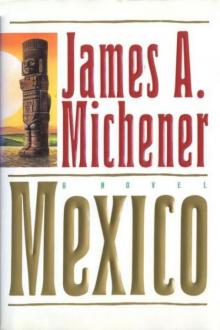 Mexico
Mexico The World Is My Home: A Memoir
The World Is My Home: A Memoir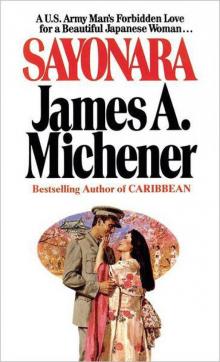 Sayonara
Sayonara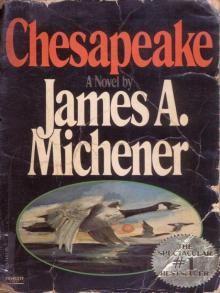 Chesapeake
Chesapeake The Novel
The Novel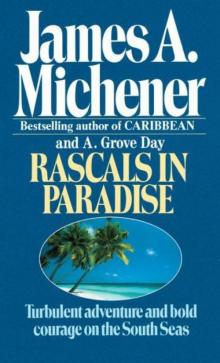 Rascals in Paradise
Rascals in Paradise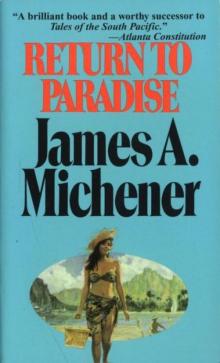 Return to Paradise
Return to Paradise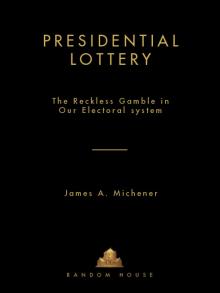 Presidential Lottery: The Reckless Gamble in Our Electoral System
Presidential Lottery: The Reckless Gamble in Our Electoral System The Source
The Source Poland
Poland Space
Space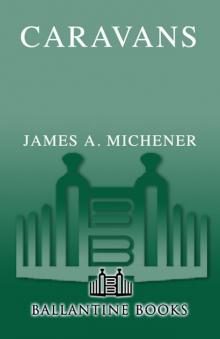 Caravans
Caravans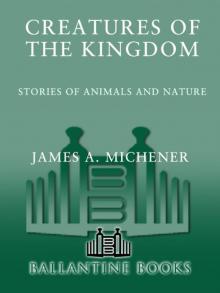 Creatures of the Kingdom: Stories of Animals and Nature
Creatures of the Kingdom: Stories of Animals and Nature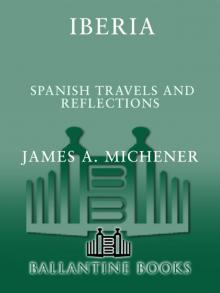 Iberia
Iberia Hawaii
Hawaii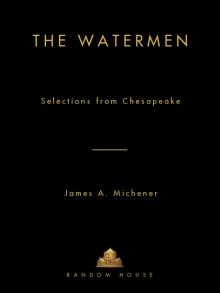 The Watermen: Selections From Chesapeake
The Watermen: Selections From Chesapeake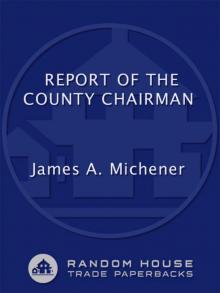 Report of the County Chairman
Report of the County Chairman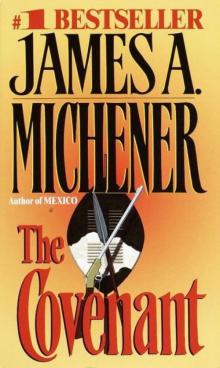 The Covenant
The Covenant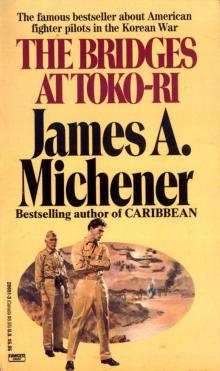 The Bridges at Toko-ri
The Bridges at Toko-ri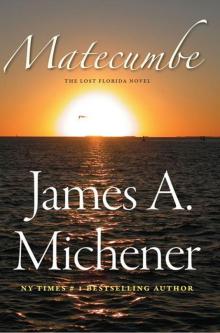 Matecumbe
Matecumbe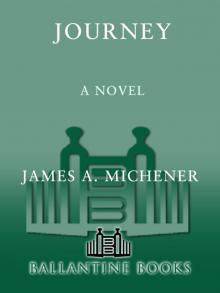 Journey: A Novel
Journey: A Novel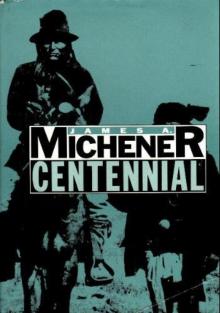 Centennial
Centennial Sports in America
Sports in America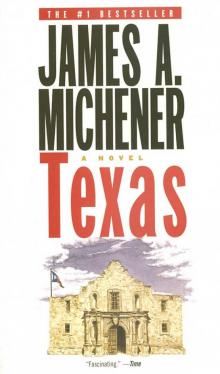 Texas
Texas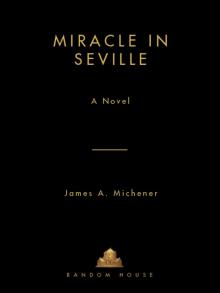 Miracle in Seville
Miracle in Seville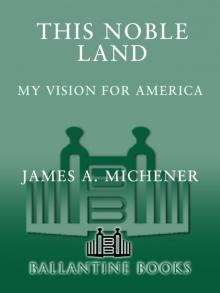 This Noble Land: My Vision for America
This Noble Land: My Vision for America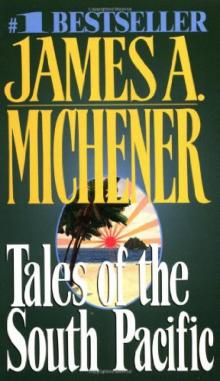 Tales of the South Pacific
Tales of the South Pacific Bridges at Toko-Ri
Bridges at Toko-Ri Space: A Novel
Space: A Novel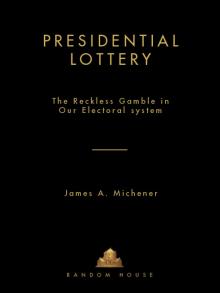 Presidential Lottery
Presidential Lottery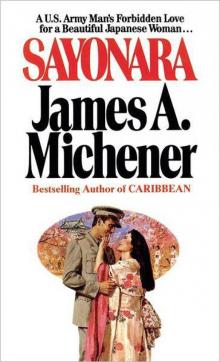 Sayonara: A Novel
Sayonara: A Novel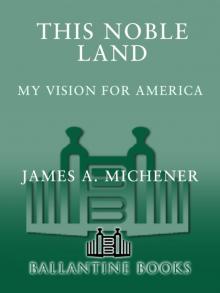 This Noble Land
This Noble Land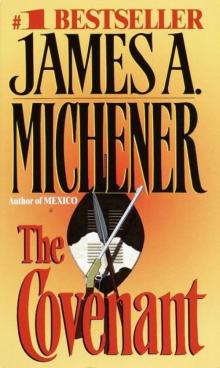 The Covenant: A Novel
The Covenant: A Novel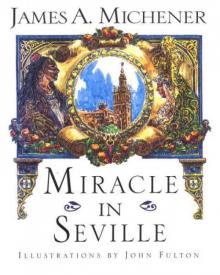 Miracle in Seville: A Novel
Miracle in Seville: A Novel The Bridge at Andau
The Bridge at Andau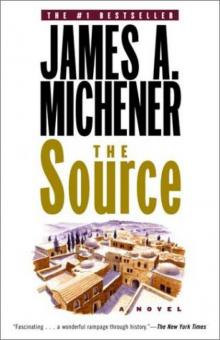 Source
Source The Source: A Novel
The Source: A Novel Journey
Journey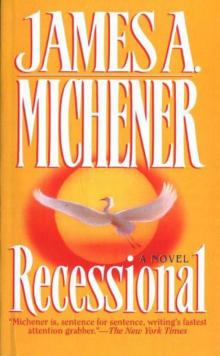 Recessional: A Novel
Recessional: A Novel Legacy: A Novel
Legacy: A Novel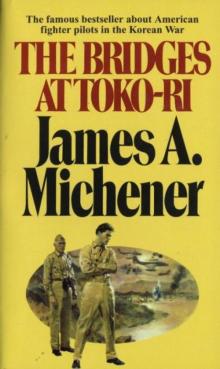 The Bridges at Toko-Ri: A Novel
The Bridges at Toko-Ri: A Novel Poland: A Novel
Poland: A Novel